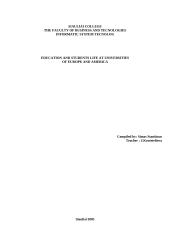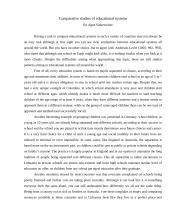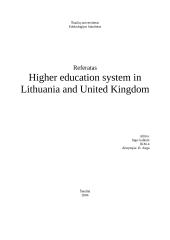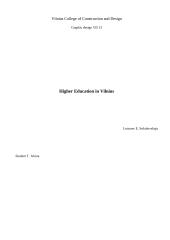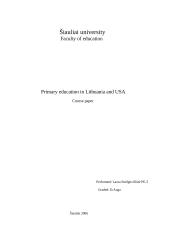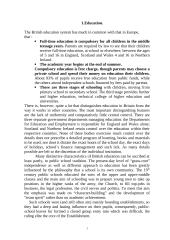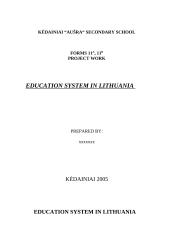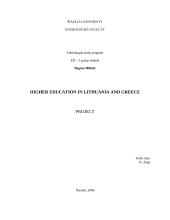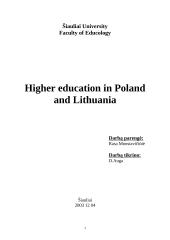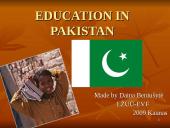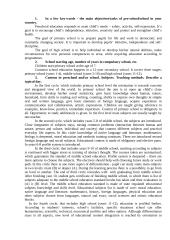Referatai
Religious education at school
Šiauliai university Faculty of education RELIGIOUS EDUCATION AT SCHOOL Course paper Performed: Laura Smilgevičiūtė PE-5 Graded: D.Auga Šiauliai 2006 Introduction There are many religious in the world. Some people profess Buddhism, other Christianity and etc. Religious education teaches the doctrines of religion. Its usual purpose is to teach children the basic of a religion. A less common purpose is to teach new adherents of a religion. Teaching religion in school responds to the right of parents to educate their children accordingly to their faith and convictions. Everyone believes in something and nowadays every adult have possibility to change his faith. Naturally in families children are teached to believe in their parent's faith without having possibility to choose. But is it very important to teach children religious at school? What is the school's role in this way? I have chosen to talk in my work about religious education at school. Is it very important nowadays to educate little children our nation religious? Maybe we have to give possibility to choose then child grows up, not pushing him before? I will try to discuss the main things of religious education at school, what is teaching this education. Of course, in my work I will represent some European and other countries and a little bit about their religious education. Also I will try a little bit to compare their religious instruction with Lithuanian religious education. And to talk about future, what can be done in religious education structure. My work purpose is to introduce religious education not only in our country's schools, but also to get know other system and ideas of religious teaching. Also to find out what is the meaning of teaching religion, is it really necessary for people. Maybe by analyzing it will be easier to decide: maybe we have to change something in our education system if we don't want to harm our children and to grow up them as honest, virtuous and faithful persons ? The teaching of religions in certain countries There are different religious faiths in the world, but all of them have their particular rules and ways how to teach religion. Of course the greatest and the first duty to do it belongs to the parents - those who gave the gift of life in the first place. But understanding nowadays level of business of the parents this job has to be done in the schools also. Here are some countries, there is dedicated certain attention to religion. "In the United States, religious education is often provided through supplementary "Sunday school", "Hebrew school", catechism ant etc. taught to children at their family's place of worship, either in conjunction with worship services or some other time during the week, after weekday school classes. Some families believe supplementary religious education is inadequate, and send their children to private religious school, called parochial schools when they are affiliated with a specific parish or congregation. Many faiths also offer private college and graduate-level religious schools, which may be accredited as colleges. Under U.S. law, religious education is forbidden in public schools, except from a neutral, academic perspective. For a teacher or school administration to endorse one religion is considered an infringement of the "establishment clause" of the First Amendment. The boundaries of this role are frequently tested, with court cases challenging the treatment of traditional religious holiday, displays of religious articles and documents such as the Ten Commandments, the recitation of the Pledge of Allegiance, and how prayer should be accommondated in the classroom. " (8) In United States many families other religion use religious schools. The state supports one (usually) central seminary which trains pastoral staff for the state church. Other religious may support private seminaries, but these are smaller and not as well funded. Religions other than the state religion, even if ancient and respectable, are often deprecated in the national cultures. "In Belgium, religious instruction is oriented towards an integration of Creed, liturgy, Christian ethics and daily life. For classes dialog and discussion are used which allows students the opportunity to draw on and question their own experiences ant to address interesting problems." (1) " Holland is a very secular country. Forty- two percent of the population does not identify itself with any religious faith or denomination, although 61.2 % of the schools are confessional: 31.1 % are catholic, 26.6 % evangelical. The administration of the public schools has the right to choose between such disciplines as the Bible and the spiritual life or the history of Christianity. The administration of the evangelical schools also chooses a theological orientation for religious instruction." (1) " In Portugal , all elementary school teachers are prepared to teach religion. Only if one objects to doing so, is a special teacher nominated. During the first job opening for teaching religion in Portuguese schools, 385 persons were selected: 236 priests, 11 religious brothers, 8 religious sisters, 48 laymen, and 82 laywomen. Of all religion teachers, 23.8 % teach only this discipline; 72.2 % teach other subjects in addition to religion. Church authorities nominate specialists who prepare religious instruction programs for the schools. The Ministry of Public Education compensates them for this work and provides all the necessary means for integrating religious instruction into public education. " (1) In Austria the conviction prevails that religious education must be inculturated firmly. The Austrians are trying to express religious content through the traditional forms of their culture." Religious Radio and TV programs are also utilized in Austria as resources for teaching. A characteristic specific to the Austrian situation is that there is no religious instruction in professional schools, which constitutes a kind of discrimination of this group of students with damage for their moral and cultural development. " (1) A similar situation once held in Germany. "In France, the state recognizes no religion and does not fund religious education. However, the state subsidizes private teaching establishments, including religious ones, under strict conditions of not forcing religion courses on students and not discriminating against students according to religion. An exception is the area of Alsace-Moselle where, for historical reasons (it was ruled by Germany when this System was instituted in the rest of France), the state supports public education in some religions mostly in accord with the German model." (8) In Thailand, Burma and other majority Buddhist societies, Buddhist beliefs are taught in school, often by monks. Young men are expected to live as monks for several months at one point of their lives. "In Japan, Buddhism, activity, reinforced by public ceremonies and parades. There are also some Christian schools, but the majority of their students are not themselves Christians and receive no religious education at these schools. " (8) In Spain religious education become a discipline no different from any other course. This solution determined the bishops issued document " Pastoral Directory for Religious Education at school. In this document there are 4 triennial cycles which include all scholastic formation from elementary school (ages 5 to 6) to the last years of high school (ages 17 to 18). " 1. The elementary cycle seeks to awaken the religiosity of children, to form their trust in God the Father and to encourage in them a desire to be similar to Jesus. 2. The middle cycle seeks to create a first synthesis of the faith based the on concrete signs of faith, religious practice, and the formula of the Creed. 3. The higher cycle seeks to personalize one's faith and highlights God's presence and action in the world, in history, in Jesus Christ and in the Church. 4. The cycle of maturity focuses on the critical period of faith then young people recognize themselves as person, reflect on their social interactions and on their situation in the secular world. " (1) Religious education in Lithuania Traditionally, Lithuania has been a Roman Catholic country. In Lithuania between the two world wars Religious education in public schools was compulsory. Although there was no established religion, all denominations received some state support in rough proportion to their size. The constitution of 1992 guarantees "freedom of thought, religion, and conscience" to all and "recognizes traditional churches and religious organizations of Lithuania." Other religious organizations have to pass a test to ensure that their teachings do not "contradict the law and morality." All recognized churches are guaranteed the rights of legal persons and can govern themselves without state interference. Religious teaching in public schools is allowed if parents desire it. (6) Nowadays the law of Lithuanian education says: " Upon the wish of the parents (or guardians), children may have religion instruction in school by individuals authorized by church dignitaries of the chosen denomination. Children in ward shall be instructed in the religion which is professed by their families or relatives. " (7) And that child can decide the future of his religion education after age 15 year. Talking about religious education, so we have some Catholic schools in Lithuania (about 20) and their main character is: "creating of the spirit of the freedom and love of the gospel, and organizing a setting of the growing up of their personality." (2). Religious education is very important subject. Of course children have some lessons of religion in public schools, but they are a little bit different. Most of our teachers of Religion, simply teach religious truths or liturgical practices, and seek little or no relationship with the children daily issues. They often avoid dealing with the so-called "burning" moral and existential problems such as drugs, sex, politics, human rights, esoteric or parapsychological theories fashionable even among educated adult people. (4) The fact is that Moral and Religious education as yet fails to help our students to cope with their daily problems of making moral and religious choices on the post- occupational "market" of very vital and rather problematic values. Comparison As we see, where is no big different between our religious education and other countries. It goes without saying, that different faith have different purposes so countries, where religion is not Catholic have other ideas how and what to teach children. As you read, some countries don't prefer to religious education, on the other hand religion is almost the main thing in education in other countries. Future of religious education in EU (European Union) Even if religious instruction is not absolutely defined, it is possible to make some predictions: " In the countries of EU, the largest religious denominations will prevail in teaching religion in public schools. Religious minorities will organize such instruction outside of school - in parishes, weekend school etc. Humanistic disciplines - ethics, etc. - will prevail as alternatives to religious instruction. Parents, and in the higher grade the young people themselves, will be given the choice between religious instruction and some other secular, humanistic discipline. Inter-Confessional religious instruction or formation appears to have little likelihood of occurring; parents have the right to see their children instructed in the fullness of their own faith. Positive information about other Confessions, religions and world-views will be provided in all public schools. EU legislation will provide the basic principles for religious education in public schools, leaving individual countries free to act according to their own traditions and situations. Where religious education occurs in public schools, the initiation of believers, which especially pertains to the believing community (e.g., for Catholics, preparation for the Sacraments of Confirmation, Penance and Eucharist), will take place in the parish and not in the school. The continuing education of teachers will be necessary, so that they can keep pace with the rapidly changing circumstances of modern life. Hopefully, associations of teachers and religion instructors will exist in all EU countries and will collaborate among themselves on the international level. " (1) How to improve religion education " Religion and moral education can really start making a difference in our young people's lives, in our school situation, and become a sigh of hope. " (4) What can be done to establish better foundations of religious education: Theology and Bible are very important in teaching religion. Also it is very important to teacher to know how a child learns. To understand Christianity cognitively, we need to teach rationally, objectively and reflectively. Interdisciplinarity is important in creating connections between Christianity and people's lives. Dialogue between teacher and child is important to both sides. Not only cognitive knowledge, but praxis with reflection are important. (5) " the Religious education should have in mind the needs of different groups of students, children mostly found in the same class: there will be come believers, some non- believers, and some doubting searchers. "(4) Religion unifies people from all the world. Teaching children religion at school or in family teaches them to be a good persons, of course if religious education would be without gap. Conclusion All things considered, religion is like a stanchion to people, who really believe. To find the real way to God and faith it is need to know the basic things of religion. And not only native country, because human have possibility to choose in what God to believe, what religion profess. Where are a lot of discussions about religion education: is it necessary at school or not, but in my work I tried to represent religious education at school, the main things of this teaching. And not only in Lithuania, but also in other countries, where are other faiths. Of course I tried to find out what is the best way of teaching religion in order to impart it to children. And I tried to look in religious education in future, to summarize replacements. Maybe my work would help parents to decide to let their children lean in Catholic schools, or would it be enough religion lessons at public schools. Religious education is really important thing in human life, so we need to pay more attention, ant to make this educational structure as better as we can. Literature 1. Aliulis Vaclovas. The teaching of Religion Education in certain European countries//Spring university. Changing education in a changing society.Klaipėda.1998 2. Baniulis Algis. The role of the school in moral education// Spring university. Changing education in a changing society. Klaipėda.1998 3. Matuzas Alfonsas. The new accents of the catholic faith in the Lithuanian educational system.// Spring university. Changing education in a changing society. Klaipėda.1998 4. Stasiulevičiūtė Alma. Religious and moral education in Lithuanian schools: a sigh of hope?// Spring university. Changing education in a changing society. Klaipėda.1998 5. Pilli Einike. Christian education in schools - ecclesiastical or educational approach?// Spring university. Changing education in a changing society. Klaipėda.1998 6. Lithuania. Religion. [http://www.country-data.com/cgi-bin/query/r-8290.html] 7. Low on education. [http://www.bibl.u-szeged.hu/oseas/lithlaw.html] 8. Religious education. [http://en.wikipedia.org/wiki/Religious_education] 9.Curriculum Framework . Process and affective Outcomes .[ http://www.catholic-forum.com/churches/cathteach/relig_assCurFr.htm] 10. General Assessment Types which can be used in a school's RE programme [http://www.catholic-forum.com/churches/cathteach/relig_assessmenttypes.htm]
Šį darbą sudaro 2463 žodžiai, tikrai rasi tai, ko ieškai!
★ Klientai rekomenduoja
Šį rašto darbą rekomenduoja mūsų klientai. Ką tai reiškia?
Mūsų svetainėje pateikiama dešimtys tūkstančių skirtingų rašto darbų, kuriuos įkėlė daugybė moksleivių ir studentų su skirtingais gabumais. Būtent šis rašto darbas yra patikrintas specialistų ir rekomenduojamas kitų klientų, kurie po atsisiuntimo įvertino šį mokslo darbą teigiamai. Todėl galite būti tikri, kad šis pasirinkimas geriausias!
Norint atsisiųsti šį darbą spausk ☞ Peržiūrėti darbą mygtuką!
- Mokslo ir švietimo referatas
- 10 psl., (2463 ž.)
- Word failas 61 KB
- Lygis: Universitetinis
- ✅ Yra šaltiniai
Mūsų mokslo darbų bazėje yra daugybė įvairių mokslo darbų, todėl tikrai atrasi sau tinkamą!
Panašūs darbai
Privalumai
Atsisiuntei rašto darbą ir neradai jame reikalingos informacijos? Pakeisime jį kitu nemokamai.
Pirkdamas daugiau nei vieną darbą, nuo sekančių darbų gausi 25% nuolaidą.
Išsirink norimus rašto darbus ir gauk juos akimirksniu po sėkmingo apmokėjimo!
Atsiliepimai
















